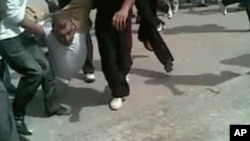Istanbul has hosted a meeting of members of the Syrian opposition leaders. The meeting came as Turkey, which has close relations with its Syrian neighbor and its leader President Bashar al-Assad, is facing growing pressure to harden its opposition to the ongoing oppression of Syrian protestors. But Ankara finds itself performing a difficult diplomatic balancing act.
Most of those attending the meeting were drawn from the Syrian opposition in exile, like Walid Saffour President of the London based Syrian Human Rights committee. He says he is in regular contact with people in Syria and says the situation is out of control.
"The latest development in Syria very very horrific, we heard about victims killed on the streets and nobody approaches them for fear of being shot. From my point of view, I want Turkey to apply further pressure. The role of Turkey is a key one in the situation," he said.
The Turkish government has in the last few years built very close political and economic ties with its Syrian counterpart. Senior Turkish diplomat Selim Yenel says they are in regular contact with Damascus and are pressing for restraint and reform.
"We have already talked to the leaders of Syria and our prime minister has talked to President Assad, telling him that the reform movement is there and he should listen to the voice of the people," Yenel said.
Despite such calls, the latest bloody crackdown by Syrian forces on the opposition has led some Syrian opponents to voice frustration over what they say is Ankara's "softly softly" approach. Anas Abdah, chairman of the international branch of the Damascus Declaration an umbrella group of Syrian opposition groups, says the turkish government has to get tough with Damascus.
"I dont think the Syrian leadership is listening to Turkey at this moment of time. It is the time for the Turkish leadership to take that one step further and work with the international community to help and take all the measures to stop targeting the civilians," Abdah said.
The extra step Abdah is referring to is support for international sanctions, backing for a UN Security council motion against Syria and for cases to be opened against the Syrian leadershop at the international criminal court. But Ankara has so far balked at such demands. Istanbul University political scientist Nuray Mert says the Turkish government has invested heavily in developing its relations Syria. He said taking a tough stance against Damascus also risks alienating another key ally, Iran.
"If Iran loses Syira they will lose an important base of power in the Middle East, their direct link with Hizbollah, so it will be a major defeat for Iran. So within this framework, if Turkey sides with, or even implicit support to the dissidents and support sort some of regime change and Iran will take it, as directly against itself and it will ruin our relations with Iran." Mert said.
For Turkish prime minister Recep Tayyip Erdogan, who is fighting a general election, the situation brings into focus two of his most important diplomatic triumphs. Those triumphs were turning rivals Iran and Syria into close friends. But politcal columnist Soli Ozel of the Turkish daily Haberturk points out the islamic roots of the ruling AK party makes it more ideologically in tune with opponents of the Syrian regime like the Muslim brotherhood, than the staunchly secular Syrian leadership.
"Ideologically it has far more in sympathy with the brotherhood which is properly the backbone of the opposition, but it has heavily invested in the Assad regime. And like everyone else, they fear a violent destruction of the regime will create untold calamities for everyone around. The government is caught between a rock and hard place," Ozel said.
But with the death toll rising in Syria and its western allies both in Europe and the US hardening their stance toward Syria, observers say pressure on Ankara to take a stand against Damascus can only grow.
Syrian Unrest Presents Tough Balancing Act for Turkey




